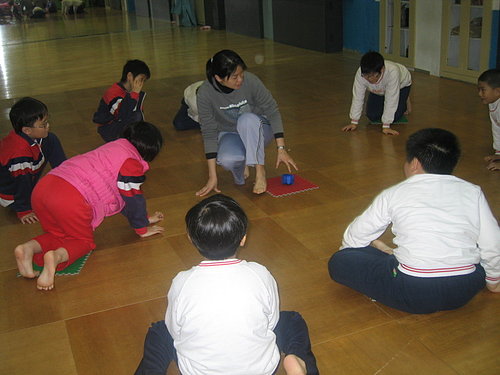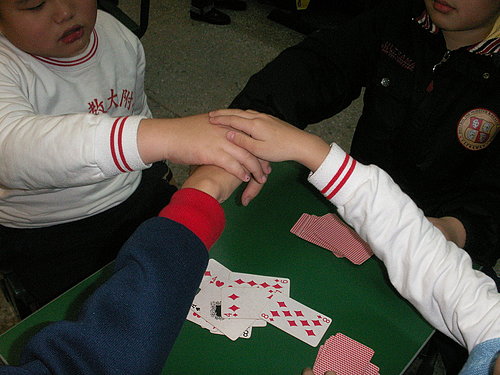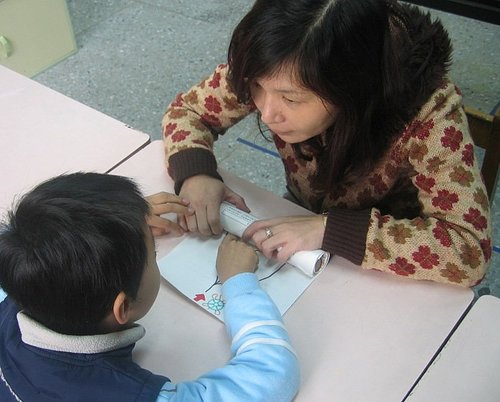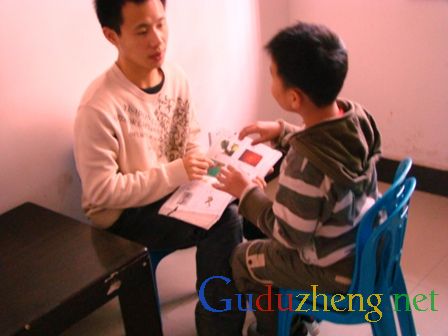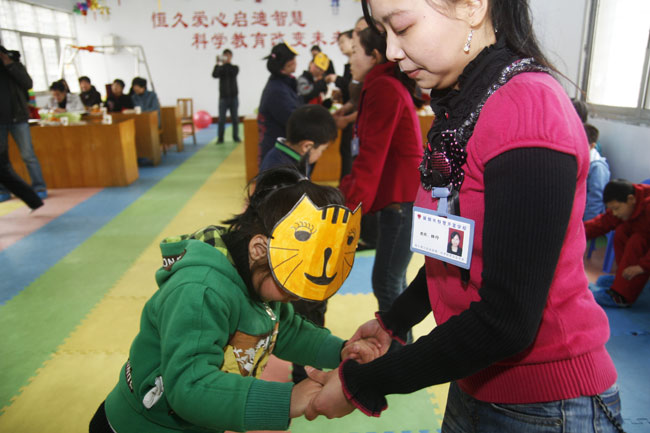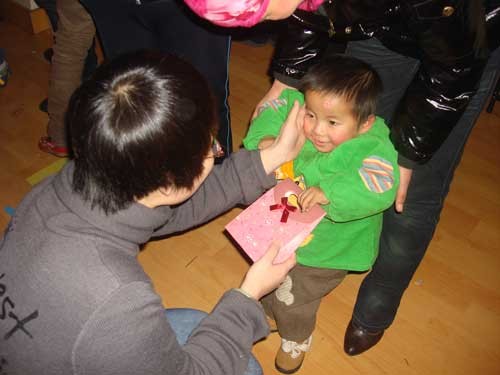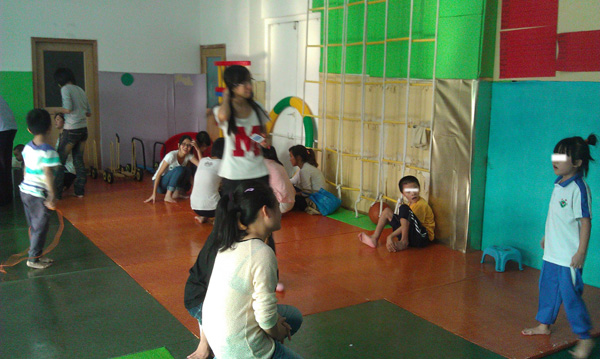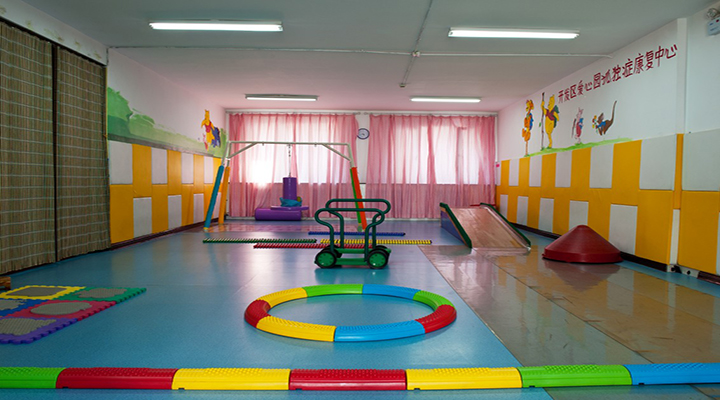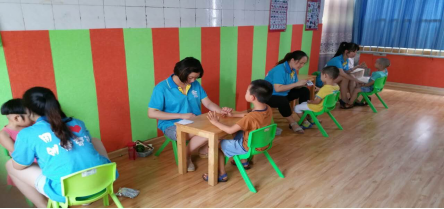译者自述:以下是我3岁的儿子在美国接受rdi训练法时的部分材料。我将其翻译出来与你们共享:
阐述性交流(declarative communication)是利用语言来提供机会分享经验的。当一个人进行阐述性交流时, 目的是与其它人分享想法、透视、想法, 和预言。非语言的阐述性交流方式包含着很多信息。使用阐述性交流的人心扉对别人敞开,把别人观察到的增加到他们已有的知识中。在自然里,它的知识不断累积。对阐述性交流的反应是不能强记的, 也无法由开始阐述性交流的人设定好固定的模式 。阐述性交流可以是自我导向的(self-directed) 。当一个人使用自我导向式的阐述性交流时, 他们使之有助于调控他们自己的想法和行动。当我们计划将来, 回忆过去, 解决疑难问题, 或期望未来时, 我们就是在使用自我导向式的阐述性交流。
指令性交流, 相反地, 是意味一个事件的结束。指令性交流要求对正确和错误作出反应。对指令性交流的反应是一种固定的模式, 是可以预知的。非语言性的交往和情感信息的分享在指令性交流里是不重要的。指令性交流实际上是实用主义似的。它包括:命令、以固定方式提问,提示, 和请求等。
通常认为阐述性交流与指令性交流的比率应为80/20。
下列是不同的类型一些阐述性交流的例子:
评论 (COMMENTS)
我真喜欢玩汽车。(I really like playing with cars.) 我们去麦当劳吃了午餐。(We went to McDonald’s for lunch.) 我喜欢咱们扔石头时水花四溅的样子。(I like the way the water splashes when we throw in the rocks.) 那吵闹声可真是太大了。(That was a really loud noise.) 他跌倒了,还受了伤。(He got hurt when he fell.)
声明 (DECLARATIONS)
今天是我的生日。(Today is my birthday.) 我来试试,看能不能赢。(I am going to try and win.) 我不喜欢他大声喊叫。(I don’t like when he yells.) 我们赢了! (We won!) 我想扮演牛仔。(I want to play cowboys.)
预言 (PREDICTIONS)
我赌红车会赢。(I bet the red car wins.) 兔子正心不在焉, 乌龟有可能会先跑到那儿。(The rabbit is not paying attention, so probably the turtle will get there first.) 今天是星期二, 因此我打赌有薄饼为午餐。(Today is Tuesday, so I bet there is pizza for lunch.) 我认为爸爸一定会喜欢这个! (I think Daddy is really going to like this!)
反映 (REFLECTIONS)
史密斯女士给我们的款待真是棒极了。(It was really nice of Ms. Smith to give us a treat.) 你画的图颜色很好。(You made a colorful picture.) 他跑得极快。(He is a super fast runner.) 我喜欢我们同时拍手。I liked when we clapped at the same time. 那一个可真不错! (That was a really good one!) 我记得我们曾经去海滩还捡了一些贝壳。(I remember when we went to the beach and found some shells.) 那天天气可真好。(It was such a nice day.)
邀请 (INVITATIONS)
我们下一步该做什么?(What should we do next?) 接下来我们可以玩(汽)车...(We could play cars next…) 我能让我的(汽车)跑得飞快!(I can make mine go super fast!) 您要不要玩我的赛车? (注意:答复可以是或否。因而是宣示性的)(Would you like to play with my race cars? (declarative if it is ok for the answer to be no)
尝试规则(ATTEMPTS AT REGULATION)
嘿, 那玩意儿对我来说太快了。(Hey, that one was too fast for me.) 您把我给忘掉了! (You forgot about me!) 希望轮到我来玩玩。(I would like a turn.) 看来杰克想试试。(Jack looks like he wants to try.)
自控(SELF REGULATION)
我能做! (I can do it!) 我需要慢下来再试试。(I need to slow down and try again.) 如果他给我一个机会, 我会试试的。(If he gives me a turn, I will try it.) 哎呀! 我忘记给她了。(Oops! I forgot to give that to her.)
共享经历(SHARED NARRATIVE)
很有趣, 我想知道下一步会怎样。(That’s so funny, I wonder what will happen next.) 你最初下山了, 现在汽车来了! (First you went down the hill, now here comes the cars!) 如果那里有妖怪, 我们该怎么办? (If the monster is in there, what should we do?) 我们怎么能使爸爸生日时让他大吃一惊? (How could we surprise Daddy for his birthday?)
自我经历(SELF NARRATIVE)
当妖怪从豆豆袋中跳出来时, 我就把球扔给他! (When the monster popped out from the bean bags, I threw a ball at him!) 去教会之后, 我们早餐吃了蛋。(After we went to church, we had eggs for breakfast.) 我喜欢他们。(I liked them.) 走进来前, 我要脱鞋,挂好我的夹克。(Before I come inside, I will take off my shoes and hang up my jacket.)
热情(ENTHUSIASM)
我们成功了! (Woo! We did it!) 我们干得真漂亮! (We are awesome!) 嘿呀! 那真疼! (Ouch! That hurt!) 噢, 我真害怕! (Oh, I am so scared!) 支持 (SUPPORT) 你能做好的! (You can do it!) 她真是一个很好的篮球手! (She is a really good basketball player!) 你下次就能干好了! (You’ll get it next time!) 我可以帮你干那件事吗? (Can I help you with that?)
公告(ANNOUNCEMENTS)
我们今天去公园。(We are going to the park today.) 您的拼写测试成绩好极了. (You did a great job on your spelling test.) 我会要一些冰淇凌。(I would like some ice cream.) 绿色是我喜爱的颜色。(My favorite color is green.)
透视分享 (PERSPECTIVE SHARING)
我不喜欢Scooby Doo滑稽狗 。(I don’t like Scooby Doo.) 荡秋千使我的肚子感到很舒服。(Going on the swings makes my tummy feel funny.) 那本书很难读懂。(That book was hard to read.) 我怕狗叫。(It scares me when the dog barks.)
阐述性问题 (DECLARATIVE QUESTIONS)
如果你已经知道答案, 那问题就不是阐述性的。(If you already know the answer, the question is not declarative.) 你知道我是怎么想的吗? (Do you know what I think?) 为什么我们不一起试试那个呢? (Why don’t we try that together?) 我想知道如果我们把这两个东西合在一起会怎么样呢? (I wonder what will happen if we mix these two things together?) 你最喜爱哪个呢? (Which one is your favorite?) 你觉得怎么样...? (What do you think about…?)
- 发表跟帖
- 相关文章
 家长一点通:
家长一点通:



